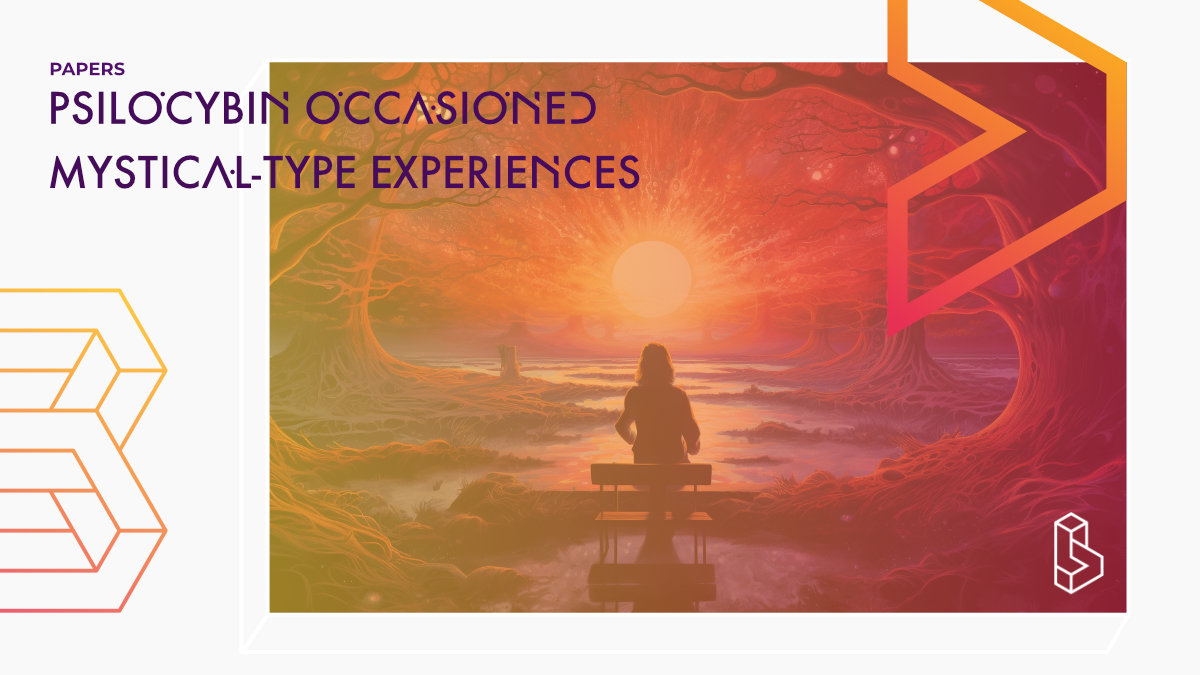This double-blind, randomized study (n=18) investigated the effects of psilocybin at different dosages. It found that positive effects were most pronounced at 20/30mg per 70kg. At two and 14 months later, participants indicated positive changes and rated the experience as one of the top 5 life experiences.
Abstract of Psilocybin occasioned mystical-type experiences:
“Objectives This double-blind study evaluated psilocybin (0, 5, 10, 20, 30 mg/70 kg, p.o.) administered under supportive conditions.
Methods Participants were 18 adults (17 hallucinogen-naïve). Five 8-hour sessions were conducted individually for each participant at 1-month intervals. Participants were randomized to receive the four active doses in either ascending or descending order (9 participants each). Placebo was scheduled quasi-randomly. During sessions volunteers used eyeshades and were instructed to direct their attention inward. Volunteers completed questionnaires assessing effects immediately after and 1 month after each session, and at 14 months follow-up.
Results Psilocybin produced acute perceptual and subjective effects including, at 20 and/or 30 mg/70 kg, extreme anxiety/fear (39% of volunteers) and/or mystical-type experience (72% of volunteers). One month after sessions at the two highest doses, volunteers rated the psilocybin experience as having substantial personal and spiritual significance, and attributed to the experience sustained positive changes in attitudes, mood, and behavior, with the ascending dose sequence showing greater positive effects. At 14 months, ratings were undiminished and were consistent with changes rated by community observers. Both the acute and persisting effects of psilocybin were generally a monotonically increasing function of dose, with the lowest dose showing significant effects.
Conclusions Under supportive conditions, 20 and 30 mg/70 kg psilocybin occasioned mystical-type experiences having persisting positive effects on attitudes, mood and behavior. Implications for therapeutic trials are discussed.”
Authors: Roland R. Griffiths, Matthew W. Johnson, William A. Richards, Brian D. Richards, Una McCann & Robert Jesse
Notes on Psilocybin occasioned mystical-type experiences:
This work builds on the earlier work by Griffiths et al. (2006) that first identified the mystical-type experiences and, at a 14-month follow-up (Griffiths et al., 2008), saw that it mediated personal meaning and spiritual significance.
A follow-up study (Johnson et al., 2012) was done on the transient headaches experienced by the participants in a dose-dependent way.
Summary of Psilocybin occasioned mystical-type experiences: immediate and persisting dose-related effects
Psilocybin, the principal psychoactive component of Psilocybe and other genera of mushrooms, has been used for millennia in structured manners for divinatory or religious purposes. Its effects are primarily mediated at 5-HT2A receptor sites, and the acute subjective effects include robust changes in perception, cognition, affect, volition, and somesthesia.
Recently, the authors used rigorous double-blind methods to evaluate the acute and long-term psychological effects of psilocybin in 36 hallucinogen-naive volunteers. The results showed that psilocybin occasioned mystical-type experiences and, sometimes, significant fear.
Find this paper
Psilocybin occasioned mystical-type experiences: immediate and persisting dose-related effects
https://doi.org/10.1007/s00213-011-2358-5
Open Access | Google Scholar | Backup | 🕊
Cite this paper (APA)
Griffiths, R. R., Johnson, M. W., Richards, W. A., Richards, B. D., McCann, U., & Jesse, R. (2011). Psilocybin occasioned mystical-type experiences: immediate and persisting dose-related effects. Psychopharmacology, 218, 649-665.
Study details
Compounds studied
Psilocybin
Topics studied
Healthy Subjects
Study characteristics
Original
Placebo-Controlled
Active Placebo
Double-Blind
Within-Subject
Randomized
Participants
18
Humans
Authors
Authors associated with this publication with profiles on Blossom
Roland GriffithsRoland R. Griffiths is one of the strongest voices in psychedelics research. With over 400 journal articles under his belt and as one of the first researchers in the psychedelics renaissance, he has been a vital part of the research community.
Matthew Johnson
Matthew Johnson is an Associate Professor of Psychiatry and Behavioral Sciences at Johns Hopkins University. His research is concerned with addiction medicine, drug abuse, and drug dependence.
William Richards
William A. 'Bill' Richards is one of the pioneering psychedelic researchers (Johns Hopkins), a teacher at CIIS, and clinician in private practice.
Institutes
Institutes associated with this publication
Johns Hopkins UniversityJohns Hopkins University (Medicine) is host to the Center for Psychedelic and Consciousness Research, which is one of the leading research institutes into psychedelics. The center is led by Roland Griffiths and Matthew Johnson.
Compound Details
The psychedelics given at which dose and how many times
Psilocybin 10 - 30mg | 5x
Linked Research Papers
Notable research papers that build on or are influenced by this paper
Psilocybin dose-dependently causes delayed, transient headaches in healthy volunteersThis double-blind placebo-controlled study (n=18) found that psilocybin (5-30mg/70kg) frequently caused mild to moderate delayed and transient headaches in healthy volunteers in a dose-dependent manner.
Mystical experiences occasioned by the hallucinogen psilocybin lead to increases in the personality domain of openness
This re-analysis from two psilocybin trials with hallucinogen-naïve subjects (n=52) looked at personality changes in participants. It found significant increases in openness (but not neuroticism, extroversion, agreeableness, and conscientiousness), which remained higher than baseline for those who had a mystical experience up to a year.

